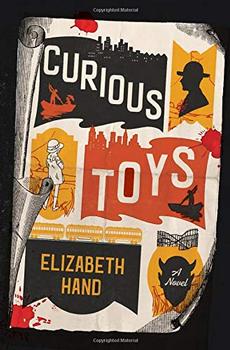Summary | Excerpt | Reviews | Beyond the Book | Readalikes | Genres & Themes | Author Bio

The women from the Relief and Aid Society complained constantly about how their white uniforms turned black as they approached Little Hell. They never drew near to Death Corner, where the Black Hand gangs that ruled Little Hell dumped the bodies of their victims beneath a dead tree twisted as a corkscrew. Pin had stopped counting the number of murders when it reached a hundred.
They had left Little Hell in May, when Gina started working as a Gypsy fortune-teller at Riverview. She also worked at the park's vast ballroom, teaching customers the latest dance crazes—fox-trot, turkey trot, grizzly-bear hug, bunny hug. Before, she'd sewn ribbons onto women's hats for a milliner in State Street. But hat sales had dropped after Christmas and never picked up again, and the shop closed in April.
There was no money for the rent. For a week they'd eaten nothing but coarse wheat flour boiled in water.
The night before they fled their tenement, Gina had locked the door to the room. Pin didn't know why she bothered; they had nothing to steal. The floors were bare dirt and the walls patched with cardboard; you could punch your hand right through. There was a hole she used to spy on the family who lived next to them, a scrawny man who used to climb on top of his wife on the kitchen table and, sometimes, his daughters.
Putting a finger to her lips, Gina dropped to her knees in front of the sofa and dragged out a burlap sack Pin had never seen before. Her mother rummaged through it, pulling out a pair of knickerbockers and a white cambric shirt.
"Get undressed and try these on. Mrs. Puglia gave them to me after her son ran off to Montana."
Pin stared at her, dumbfounded, until Gina threw the clothes in her face. Pin grabbed them, tore off her pinafore and chemise, and kicked them across the floor. She pulled on the knickerbockers and shirt, fingers shaking so she almost couldn't button them. There was no mirror in the room, but her mother's expression told her what she needed to know.
"Am I…?"
Gina nodded.
Pin bit her lip so she wouldn't cry. For as long as she could recall, this was all she'd wanted. When she remembered her dreams, she recalled being neither girl nor boy, only flying, nothing between her skin and the wind. She hated waking up, even more so in the last six months since she'd first menstruated and her mother had explained, or tried to, what the blood on her drawers portended. Childbirth, babies—the end of freedom. The end of everything.
Being a girl was like a huge scab she couldn't scrape off, no matter how hard she tried. As she stood there in her new clothes, her mother produced the shears she used to trim ostrich willows. She grasped a handful of Pin's unruly curls and began to cut.
At last the snicking of the shears stopped. Pin ran a hand across her cropped head, then took a few deep breaths so she could feel the air moving inside this strange new creature, herself. Her mother handed her an elastic truss, designed for a small man.
"Your titties are so small, you hardly need this," she said. "But wear it anyway. You have to stay safe. We're not going to use our real names—I don't want anyone knowing who we are."
"Why?"
Gina slapped her, hard enough Pin's eyes sparked. "You know why! If anyone asks, your name's Maffucci. Not Onofria: Maffucci."
Pin turned so her mother wouldn't see her tears. "What about yours?"
Excerpted from Curious Toys by Elizabeth Hand. Copyright © 2019 by Elizabeth Hand. Excerpted by permission of Mulholland. All rights reserved. No part of this excerpt may be reproduced or reprinted without permission in writing from the publisher.
Nearly all men can stand adversity, but if you want to test a man's character, give him power.
Click Here to find out who said this, as well as discovering other famous literary quotes!
Your guide toexceptional books
BookBrowse seeks out and recommends the best in contemporary fiction and nonfiction—books that not only engage and entertain but also deepen our understanding of ourselves and the world around us.